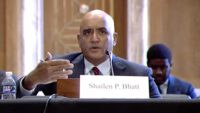The U.S. Dept. of Transportation is reviving Obama-era pilot programs for state agencies and contractors to give hiring preferences to people who live in areas where construction projects are located if they receive federal agency funding.
The local-hire initiative, which Transportation Secretary Pete Buttigieg announced on May 19, at the Frederick Douglass Memorial Bridge replacement project in Washington, D.C., drew praise from a prominent construction union but was criticized by a major contractor group.
The action would restore a program begun under the Obama administration but halted by the Trump administration.
The new programs would apply to projects with Federal Highway Administration and Federal Transit Administration funding and also will include a focus on workforce development, the department said.
[View FHWA/FTA Federal Register notice of the pilot programs here.]
The programs are to run for four years. FHWA said in its Federal Register notice that it is only interested in contracts advertised in that time period.
Reinstatement of the DOT programs are part of a series of moves by President Joe Biden to undo actions taken by the Trump administration and also are further examples of the Biden administration emphasis on equity.
In remarks at the bridge project—which used the Obama local-hire program—Buttigieg said the new pilot effort would include “low-income workers or under-invested, underserved and overburdened communities.”
Under the program, state DOTs, contractors and other “recipients and subrecipients” of FHWA and FTA funding must seek approval from the agencies to use the new local-hire pilot program on a project.
In its Federal Register notice, FHWA said in the past, projects it has funded have prohibited local-hire preferences or training opportunities in economically depressed areas where projects are located.
The agency said the bar on local-hire provisions “was based upon maintaining competition in contract bidding.” But FHWA added it also frequently resulted in having a workforce that was “not necessarily representative of all communities where projects were located.”
Buttigieg said an aim of the program would be to create jobs that would lead to “great careers in the building trades.”
Terry O’ Sullivan, general president of the Laborers’ International Union of North America, offered strong support for DOT’s move to reinstate the local-hire programs. He noted that the Frederick Douglass Bridge used a project labor agreement with the building trades.
O’Sullivan said in a statement, “Construction workers feel pride when they are building the very infrastructure they and their families use every day.”
He added, “Rebuilding outdated and deteriorating bridges and infrastructure across our entire nation is about more than just concrete and steel—it is about people and building lifelines to a more robust and competitive economy, to good jobs, and to a safer transportation system.”
The Associated General Contractors of America criticized the DOT programs.
Stephen E. Sandherr, AGC president and chief executive officer, said in a statement, “We share the administration’s desire to see more people—particularly from disadvantaged areas—enter the middle class via high paid construction careers.”
But he added, “The problem with local-hire mandates is that they solve the symptom and not the problem.”
He added: “Our members are desperate to hire workers and would love to hire local employees where they do business. But too many communities have defunded their career and technical education programs and as a result there are too often too few local workers with any interest in construction careers or basic skills that would make them attractive to hire.”
Sandherr said on some projects with local-hire provisions, 80% of those hired from nearby areas leave the project before it is complete.
The Obama administration had put in place a similar pilot program in March 2015, but it was cancelled in October 2017, under the Trump administration.
DOT said in its 2017 Federal Register notice announcing the program's halt that it had determined that promulgating a provision to allow geographic-based hiring preferences is "not practicable for the efficient and cost-effective delivery of projects.”





